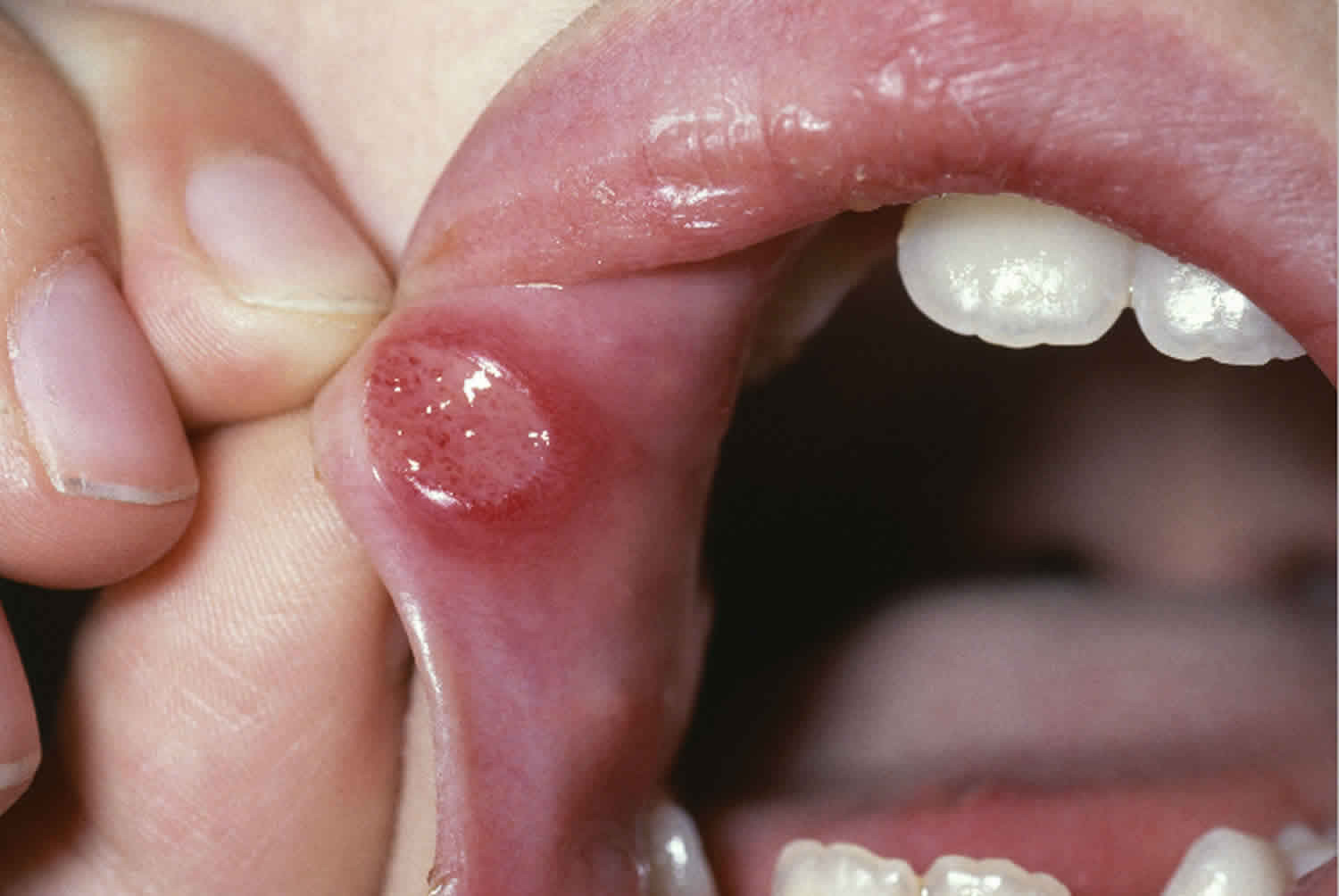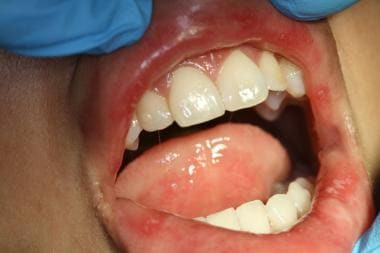Definition
Stomatitis, also known as mouth ulcers, refers to the inflammation and sores in the mouth. These ulcers can appear on the inner cheeks, gums, inner lips, or tongue. There are two main types of stomatitis: herpetic stomatitis, also known as cold sores, and aphthous stomatitis, also known as canker sores.
Causes
Herpes simplex virus 1 (HSV-1) causes herpetic stomatitis, commonly found in children between 6 months and 5 years old. Due to infection with the virus, exposure to HSV-1 can develop cold sores later in life. Although HSV-1 is related to the virus that causes genital herpes (HSV-2), they are not the same.
Aphthous stomatitis is a condition that can cause one or multiple small sores to appear on the inside of the cheeks, gums, inner lips, or tongue. This condition is more commonly found in young people, particularly those between 10 and 19.
Aphthous stomatitis is a non-contagious condition not caused by a virus. Although the exact cause is unknown, several factors can contribute to developing it, such as certain medications, oral injury, poor nutrition, stress, bacteria or viruses, lack of sleep, sudden weight loss, and some foods.
Risk factor
Several factors that can increase the risk of stomatitis include:
- Genetic factor
- Hypersensitivity or allergies to foods such as nuts, shellfish, cinnamon, or certain fruits
- Allergies to other materials, such as metal, dental materials, ingredients in toothpaste, or mouthwash
- Local injuries to the teeth and mouth, for example, false teeth that do not fit properly, injuries during brushing teeth, local anesthetic injections, or during dental treatment
- Hormonal changes (menstrual cycle, pregnancy, menstrual pain)
- Stress or anxiety
- Nutrient deficiencies (iron, folate, ferritin, vitamin B6, and vitamin B12)
- The initial period of quitting smoking
- Medicines, such as methotrexate, NSAIDs, phenobarbital
- Gastrointestinal immune diseases, such as Crohn's disease, Celiac disease
- Systemic diseases, such as Bechet's syndrome, HIV infection, pharyngitis, reactive arthritis, Sweet's syndrome
Symptoms
Cold sores, also known as herpetic stomatitis, typically manifest as clusters of blisters that appear on:
- Gum
- Palate
- Inner cheek
- Tounge
- Lip border
Blisters can make eating, drinking, or swallowing difficult or painful. Impaired drinking can lead to dehydration. Additionally, drooling, pain, and swollen gums may occur. Cold sores can cause fussiness, feeding difficulties, and drinking problems in children.
Herpetic stomatitis is a viral infection that can cause a fever, which may reach up to 40 degrees Celsius. The fever usually occurs a few days before blisters appear. Once a blister bursts, a sore may develop at the same location, and the infection progresses. The overall duration of HSV-1 infection is typically between 7 and 10 days.
Aphthous stomatitis is a condition that causes round or oval-shaped sores, also known as canker sores, with inflamed edges. The centre of the sore is usually white or yellow. Most aphthous stomatitis sores are small and oval-shaped, typically healing within a week or two without leaving a scar. However, larger sores with irregular shapes may occur due to extensive damage and take six weeks or more to heal. These larger sores can leave scars in the mouth.
Older adults may experience a condition called “herpetiform” stomatitis. This is not caused by HSV-1 virus infection. Herpetiform stomatitis appears as small canker sores comprising 10 to 100 wounds. Usually, this condition resolves within 2 weeks.
Diagnosis
The diagnosis depends on the cause of the stomatitis. Relevant physical examination is important because the doctor will gain a lot of information by observing the shape and distribution of the canker sore.
Other examinations may include:
- Swab to check for the cause of canker sores, both bacteria and viruses
- Skin scrapings or swabs for fungal infections
- Biopsy, or taking tissue for further examination
- Blood examination
- Patch test to identify allergies
The doctor will inquire about your medical history, including current and past medications, as well as your sexual and smoking history, to identify potential causes of stomatitis.
Management
Treatment of stomatitis depends on the type of stomatitis you are experiencing.
Herpetic stomatitis
The antiviral drug (acyclovir) can treat herpetic stomatitis. Consuming acyclovir can shorten the time of infection. Make sure your child drinks enough water because young children are at risk of becoming dehydrated.
A diet consisting of liquid foods and non-acidic drinks is recommended. Acetaminophen can be used to reduce pain and fever.
For severe pain, topical lidocaine can be used. However, you should be careful, as excessive lidocaine will numb the mouth and also cause swallowing problems, burning, and choking.
Aphthous stomatitis
Aphthous stomatitis is usually not severe and does not require specific therapy. If the pain is significant or the canker sore is large, a topical medication containing benzocaine or another topical anesthesia may be used. Cimetidine, colchicine, or oral steroid drugs are safely used for large, multiple, and recurrent aphthous stomatitis.
Complications
Stomatitis can cause mild or severe complications, depending on its type. Complications of herpes stomatitis can occur due to the HSV-1 infection itself.
For example:
- Herpes simplex encephalitis is a condition in which the brain becomes inflamed.
- Whitlow herpeticum is characterized by swelling and painful sores on your fingers.
- Herpetic keratoconjunctivitis is a severe complication that can cause blindness. Seek help immediately if you experience eye pain, blurred vision, or eye discharge.
Stomatitis can cause sores in the mouth that may become infected, worsening the infection. The condition can also result in pain or discomfort, making it difficult for individuals with stomatitis to stay hydrated. Additionally, difficulty eating can lead to malnutrition.
Prevention
Once you are infected with the HSV-1 virus, you will carry the virus for the rest of your life. This virus is found in approximately 90% of adults worldwide. Avoiding sharing eating utensils or kissing with a person with herpetic stomatitis can help prevent the spread of infection.
Some nutritional supplements such as B vitamins (folic acid, B-6, B-12) may be helpful for aphthous stomatitis. Some foods with high in B vitamins are:
- Broccoli
- Spinach
- Beetroot
- Calf's liver
- Nuts
- Asparagus
Good oral hygiene is also important to prevent stomatitis. You should also avoid sour or spicy foods as it can trigger the recurrence of stomatitis. Do not talk while eating, as this increases the chances of a bitten cheek. Dental wax can smooth the surface of retainers or braces. If stress is suspected to be a trigger, relaxation exercises may help.
When to see a doctor?
If you have mouth ulcers that take a long time to heal or are accompanied by a persistent fever, it is important to seek medical attention. Recurrent thrush may also indicate a more serious underlying condition or secondary infection. If you frequently experience aphthous stomatitis, it is advisable to consult a doctor.
Looking for more information about other diseases? Click here!
- dr Ayu Munawaroh, MKK
Case-Lo, C. (2018) Stomatitis: Definition and patient education, Healthline. Healthline Media. Available at: https://www.healthline.com/health/stomatitis#prevention (Accessed: March 6, 2023).
Taylor K. (2022) Stomatitis: What you need to know, Healthgrades. Available at: https://www.healthgrades.com/right-care/oral-health/stomatitis#complications (Accessed: March 6, 2023).
Unbound Medicine. Stomatitis: 5-Minute clinical consult (no date) Stomatitis | 5-Minute Clinical Consult. Available at: https://www.unboundmedicine.com/5minute/view/5-Minute-Clinical-Consult/116570/all/Stomatitis (Accessed: March 6, 2023).
WebMD. Stomatitis. Available at: https://www.webmd.com/oral-health/guide/stomatitis-causes-treatment (Accessed: March 15, 2023).












